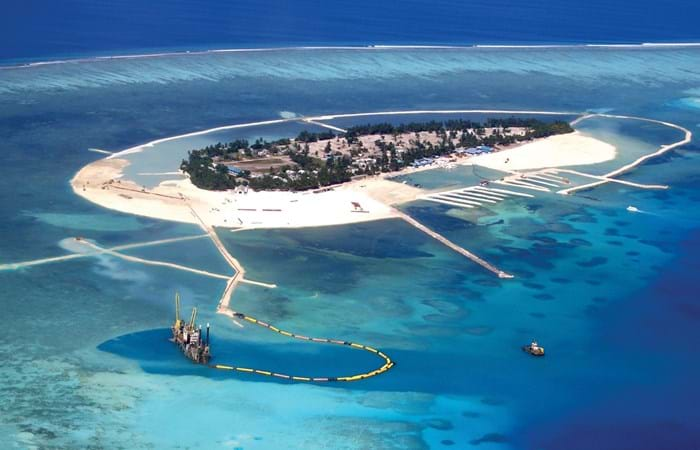The Republic of the Maldives consists of 1,190 small coral islands grouped into 26 atolls. Only 200 islands are inhabited. On 26 December 2004, a tsunami originating from Indonesian waters struck the Maldives. This natural disaster had major economic, social and environmental consequences. Of the 200 inhabited islands, 13 were totally destroyed and 56 suffered major damage, including the island of Vilufushi in Thaa Atoll. Houses and infrastructure were heavily damaged. All the surviving residents had to be evacuated to the neighboring island of Buruni to the west of Vilufushi. The government of the Maldives decided to reconstruct the entire island and to extend it considerably by landfilling the shallow reef. Boskalis International was appointed for this work.
Several alternatives were studied. The plan that was finally adopted involved dredging coral sand from an area off the northern reef edge of Vilufushi with a medium-sized cutter suction dredger. The sand was then pumped directly into the area to be filled. The reconstruction included:
- Removal of all debris.
- Dredging and reclamation of 1 million m3 of coral sand from the reef to increase the surface of, and raise, the island.
- Construction of a 2000 meter rock revetment around the island as a breakwater to protect against wave penetration.
- Dredging of a new harbor to 3 meters below sea level.
- Construction of a 350 meter quay wall using pre-cast concrete elements.
- Construction of a 350 meter breakwater to protect against wave penetration.
Monitoring during dredging and reclamation
The Maldives have a very rich marine biodiversity, which requires safeguarding through special measures, in particular during dredging and reclamation activities. A special monitoring program was required to monitor changes in environmental parameters with an adverse impact.
